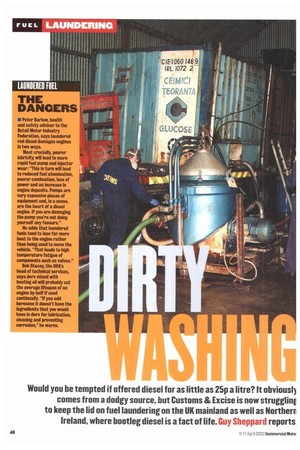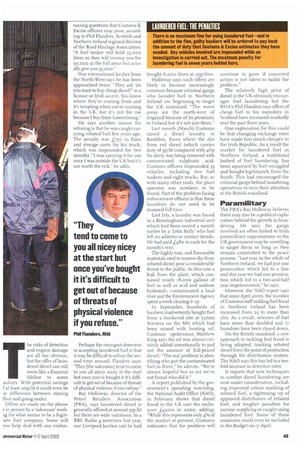Would you be tempted if offered diesel for as little
Page 48

Page 49

If you've noticed an error in this article please click here to report it so we can fix it.
as 25p a litre? It obviously comes from a dodgy source, but Customs & Excise is now strugglini to keep the lid on fuel laundering on the UK mainland as well as Northern Ireland, where bootleg diesel is a fact of life. Guy Sheppard reports
The risks of detection and engine damage are all too obvious, but the offer oflaundered diesel can still seem like a financial lifeline to some auliers. With potential savings fat least acip/lit it could even be ie difference between staying float and going under.
Offers are made on the phone r in person by a 'salesman' workig for what seems to be a legitilate fuel company. Some will yen help deal with any embar
rassing questions that Customs Excise officers may pose, according to Phil Flanders, Scottish and Northern Ireland regional director of the Road Haulage Association: "A fuel tanker will hold 35,000 litres so they will invoice you for 30,000 at the full price but actually give you 35,000."
One international haulier from the North-West says he has been approached twice: They ask 'do you want to buy cheap diesel?' in a Scouse or Irish accent. You know where they're coming from and it's tempting when you're running in the UK, but it's not for me because I buy from Luxembourg."
He says another reason for refusing is that he was caught carrying rebated fuel five years ago. The penalty was f750 in fines and storage costs for his truck, which was impounded for two months. "I was carrying it for use once I was outside the UK but it's not worth the risk," he adds.
Perhaps the strongest deterrent to accepting laundered fuel is that it may be difficult to refuse the second time around. Flanders says: "They [the salesmen] tend to come to you all nicey nicey at the start but once you've bought it it's difficult to get out of because of threats of physical violence if you refuse."
Ray Holloway, director of the Petrol Retailers Association (PRA), says laundered diesel is generally offered at around 55p/lit but there are wide variations. In a BBC Radio 4 interview last year. one Liverpool haulier said he had bought lp,000 litres at 2,5piiitre.
Holloway says such offers are likely to become increasingly common because criminal gangs who launder fuel in Northern Ireland are beginning to target the UK mainland: "The worst areas are the north-west of England because of its proximity to Ireland but its not just there.'
Last month (March) Customs raised a diesel laundry in Basildon, Essex where the dye from red diesel (which carries duty of 3p/lit compared with 46p for derv), was being removed with concentrated sulphuric acid. Customs officers impounded 55 vehicles, including two fuel tankers and eight trucks. But, as with many other raids, the plant operator was nowhere to be found. Part of the problem facing enforcement officers is that these laundries do not need to be manned full time.
Last July, a laundry was found in a Birmingham industrial unit which had been rented a month earlier by a 'John Kelly' who had left no address or contact details. He had paid £48° in cash for the month's rent.
The highly toxic and flammable materials used to remove dye from rebated diesel pose a considerable threat to the public. In this case a leak from the plant, which contained nearly r8,000 gallons of fuel as well as acid and sodium hydroxide, contaminated a local river and the Environment Agency spent a week clearing it up.
In September, hundreds of hauliers inadvertently bought fuel from a bunkered site at Lymm Services on the M6 which had been mixed with heating oil. Customs spokesman Matthew King says the oil was almost certainly added intentionally to pad out the amount of full-priced diesel. "The real problem is identifying who put the contaminated fuel in there." he admits. "We're always hopeful but as yet we've not found who did it."
A report published by the government's spending watchdog, the National Audit Office (NAO), in February shows that diesel fraud in the UK cost the exchequer £450m in 2000, adding: "While this represents only 4% of the market at present, Customs estimates that the problem will
continue to grov, if concerted action is not taken to tackle the problem."
The relatively high price of diesel in the UK obviously encourages fuel laundering but the RH A's Phil Flanders says offers of cheap fuel to his members in Scotland have increased markedly over the past three years.
One explanation for this could be that changing exchange rates have made fuel much cheaper in the Irish Republic. As a result the market for laundered fuel in Northern 1 reland, a traditional hotbed of fuel laundering, has been squeezed by fuel smuggled and bought legitimately from the South. This had encouraged the criminal gangs behind laundering operations to turn their attention to the British mainland.
Paramilitary
The PRAs Ray Holloway believes there may also be a political explanation behind the growth in laundering. He says the gangs involved are often linked to Irish paramilitary organisations so the UK government may be unwilling to target them so long as they remain committed to the peace process. "Last year, in the whole of Northern Ireland, we had just one prosecution which led to a fine and this year we had one prosecution which led to a two-and-half year imprisonment," he says.
However, the NAO report says that since April 2000, the number of Customs staff tackling fuel fraud in Northern Ireland has been increased from 23 to more than 16o. As a result, seizures of fuel have more than doubled and 17 laundries have been closed down.
On the British mainland, a new approach to tackling fuel fraud is being adopted, tracking rebated diesel from the point of production through the distribution system. The NAO says this has led to a tenfold increase in detection rates.
It reports that new techniques to combat diesel laundering are now under consideration, including improved colour marking of rebated fuel, a tightening up of approved distributors of rebated fuel, and tougher penalties for anyone supplying or caught using laundered fuel. Some of these measures could even be included in the Budget on 17 April.






















































































































































